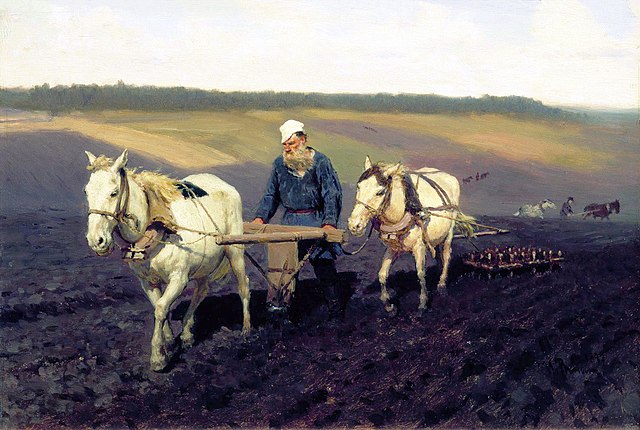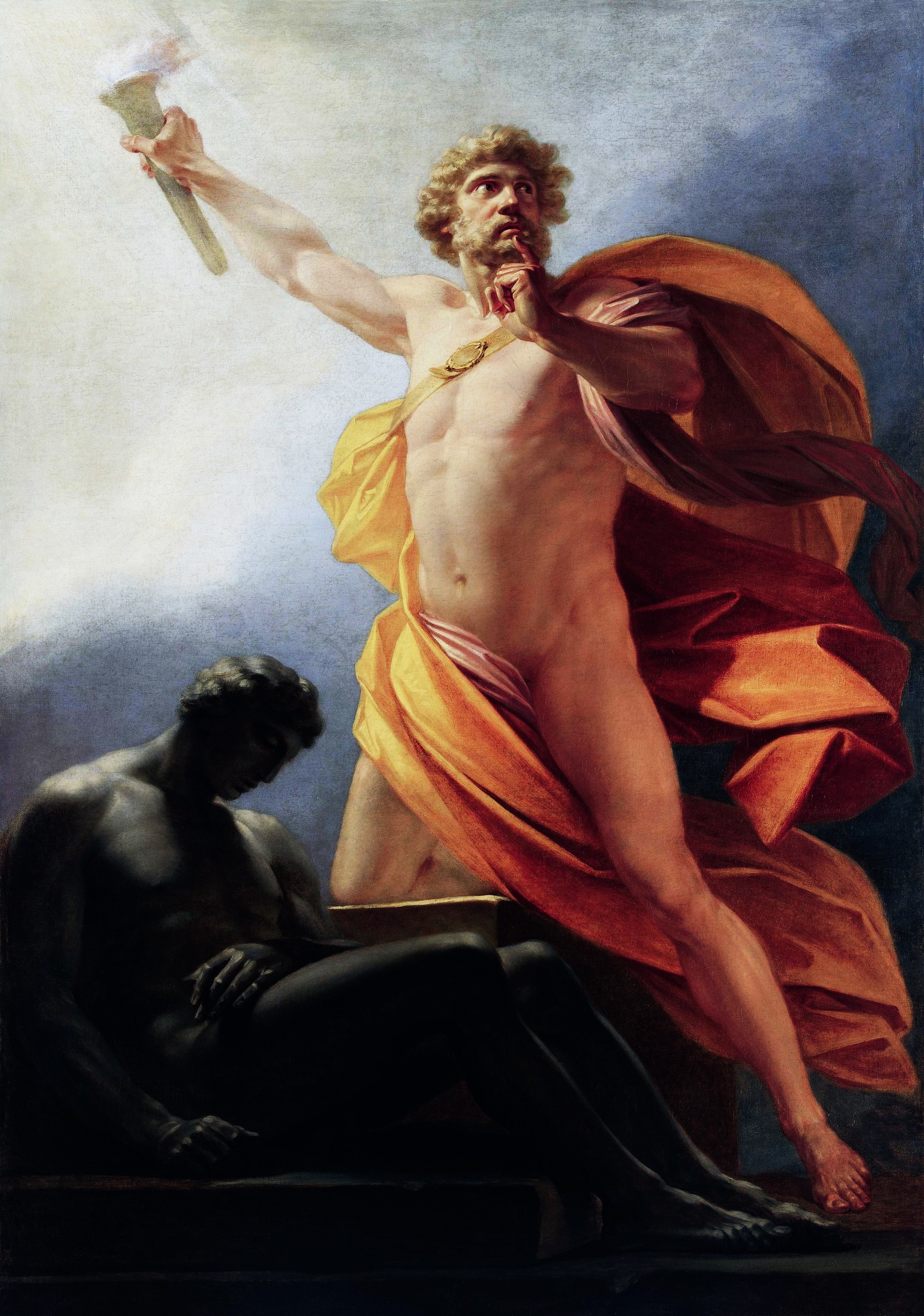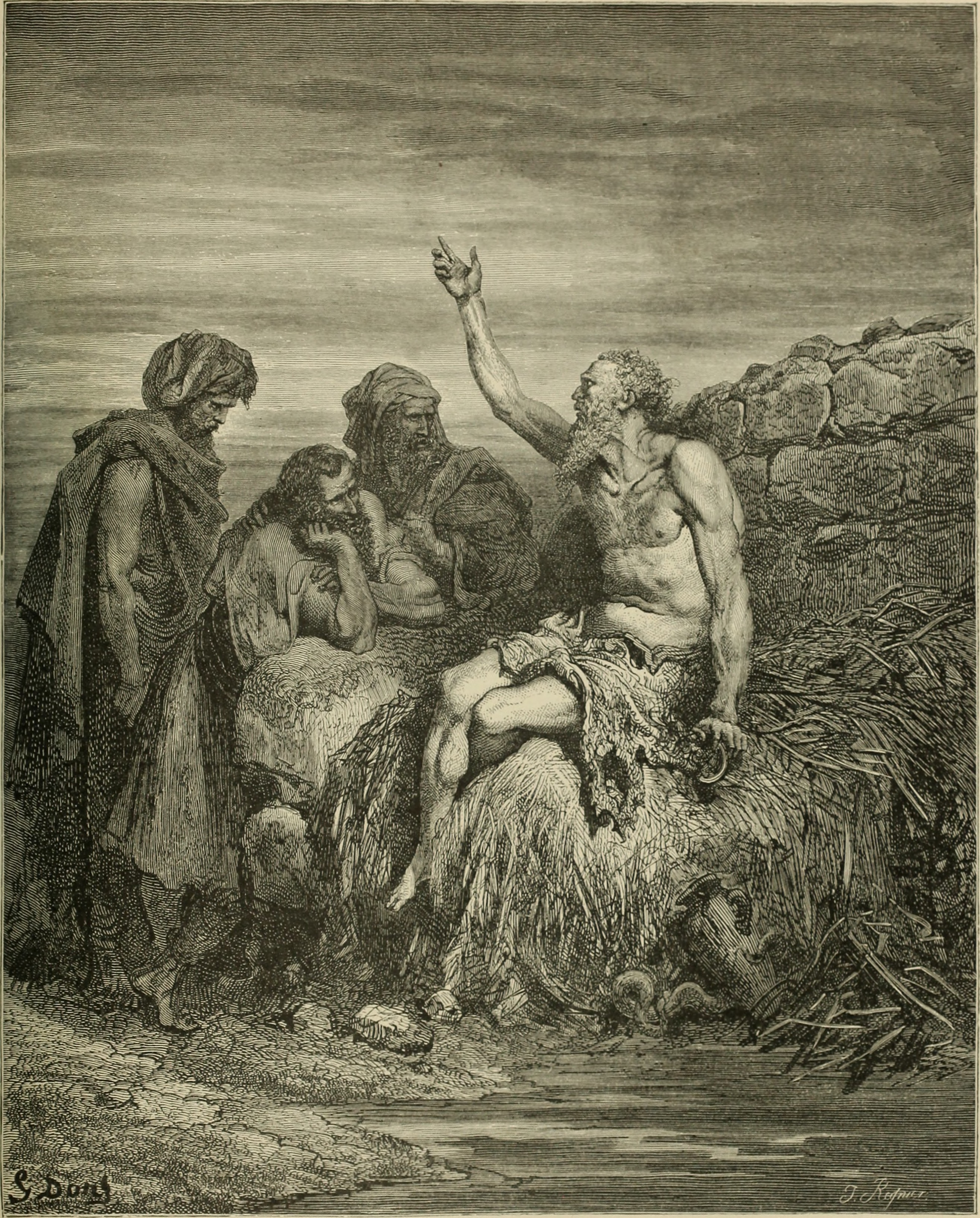Alexander Pushkin is held by his countrymen to be their greatest writer, something which always strikes Westerners as unusual. The main problem is that Pushkin was primarily a poet, and poets, particularly Russian ones, are exceedingly difficult to translate and still harder to translate well. Yet Pushkin did write prose. His novel The Captain’s Daughter, and his short story “The Queen of Spades”, are among his best-known prose works. Another is the cycle of short stories, The Tales of Belkin, which I finished recently. While I can’t deny Pushkin’s verve for verse, his prose is rather more – if you’ll forgive the pun – prosaic.
What is particularly interesting about these five stories is more how we see in them the seeds out of which grew the magnificent prose that for so many exemplifies Russian literature. A saying often attributed to Dostoevsky is that Russian writers “all came out of Gogol’s “Overcoat””. But Gogol’s story in turn came out of these tales.
For all their significance as trailblazers, though, that’s not to say that these five stories can’t stand on their own.
The Editor’s Introduction
The Tales of Belkin, as its title indicates, purport not to be Pushkin’s own work at all, but rather that of the late Ivan Petrovich Belkin. The stories are introduced to us by Pushkin himself, acting as an editor (he did run a magazine for some time). This brief introduction, though, has much to say. Most of it is given over to a letter from one of Belkin’s friends, in which he describes the late author. Belkin was a young man, “humble and honest”, who let his estate in the country go to seed and died something of a recluse with many unfinished manuscripts lying around.
The letter-writer and editor note that the tales were all reportedly told to Belkin by someone else, and these names are given in a footnote by Pushkin. This, alongside the description of Belkin himself “average height, grey eyes, reddish hair, straight nose”, and the inclusion of a real date to the letter “Nov 16, 1830”, has the effect of giving The Tales of Belkin an extra dash of realism. We feel their author is a real person because he is treated like one. Many of the stories themselves feature a narrator as a character, who is then told the main story by someone else. This is quite a democratic approach, because many of these extra storytellers are from the lower ranks of society and it gives them a voice. It anticipates Turgenev’s Collection A Sportsman’s Sketches, where the approach is used to great effect.
“The Shot”
“The Shot”, the first of The Tales of Belkin, contains one of the classic examples of a duel in Russian literature, slotting in neatly next to Evgenii Onegin, A Hero of Our Time, and that squib in Fathers and Sons. Our narrator, an officer, is beguiled by Silvio, a Russian with a distinctly non-Slavic name. Silvio is an excellent shot, and though he is not an officer but simply a nobleman living nearby, he spends much of his time with the officers. They, for their part, enjoy such traditional pleasures as carousing and shooting each other in duels. One evening Silvio suffers an embarrassment at the hands of another officer, for which he should have called him to a duel, but Silvio declines at great cost to his honour. Our narrator is confused by this, thinking that Silvio is possibly a coward. But then Silvio tells him his own story.
It turns out that Silvio cannot fight in a duel because he needs to get revenge on another man, and this requires Silvio to take care of his own life. The incident in question happened when Silvio was in the army. A newcomer turned out to be equal to Silvio in popularity and talent, and Silvio felt threatened, eventually finding an excuse to duel him. Alas, he was fighting a Russian of the new generation: “His indifference made me lose my temper. What was the point, I thought, of taking his life when he didn’t seem to give a damn what I did?” Silvio let the man live, but he was determined to get his revenge. He waits until he hears the man has married, then he goes to his country estate with the intention of finally shooting, this time against an opponent who has a reason to fear death.
It works. He does not hit his opponent, for his goal was simply to regain his lost honour. His rival survives, but shaken and embarrassed in front of his new wife. One thing that’s particularly interesting about “The Shot” is the way that it plays with our notions of truth. Not only is the narrator himself a character, but he hears the story in two halves. The first comes from Silvio, while the second part, detailing Silvio’s ultimate revenge, comes from the rival himself. The overall effect is to make us wary of trusting anyone by drawing our attention to the biases out of which our understanding of truth is necessarily built. With that said, I’m not sure how much I enjoyed the story itself, however much its ideas of honour and its narrative complexity are important for the later tradition, particularly with Lermontov, for instance.
“The Blizzard”
“The Blizzard” is another of The Tales of Belkin which seems particularly interested in narrative itself. Our heroine, Maria, has been “brought up on French novels” and has a rather overdeveloped imagination as a result. She and her lover, a poor soldier, are forbidden to meet by their parents, but together they hatch a plan to elope, relying on their parents to accept them once they are legally married. Alas, it does not work out. The night they are supposed to marry there is a terrible blizzard, and Vladimir, her husband-to-be, gets lost on the way to the church. Maria, meanwhile, reads in everything an ill omen as she heads there herself. Pushkin constantly switches perspective between the two lovers, before finally shifting forward to the next morning at Maria’s house, where she seems to wake up as if nothing had happened.
But it is not so. Maria falls ill from her failure to marry Vladimir, and her parents meanwhile forbid him to set one foot within their house ever again. Vladimir, dejected, returns to the army and fights against the French, who at this point are advancing on Russian territory (we are in 1812). We lose track of him, and then hear that he has died. But Maria, with a Romantic constancy, refuses to marry anyone else, and holds onto everything of Vladimir’s that she can lay her hands on. However, one day she meets Burmin, a Hussar, and they get on swimmingly. Yet for some reason, though time passes, he does not propose to her. At last, she pressures him into explaining himself, and he says that he’s already married. Now, finally, Burmin gives us the missing piece, explaining what actually happened in the church on the night Maria was awaiting Vladimir.
It is ridiculous. But the story is more interesting than it seems. On one level, it’s a magical “everything turns out okay” kind of ending. But it’s complicated by Pushkin’s shifting of perspectives, consciously manipulating the reader’s knowledge and setting limitations on it. Most importantly, it’s complicated by the way that Burmin himself does not recognise the woman he somehow married. While I don’t doubt she would have been wearing a veil at the time, it is still rather ominous. At least it seems so to me.
“The Undertaker”
“The Undertaker” is a rather unusual story, the most fantastical of the stories of The Tales of Belkin. Our hero is a grumpy old undertaker who has recently moved into a new house. Unlike, as Pushkin notes, the undertakers of Shakespeare or Walter Scott, his own is humourless. But that’s not to say the text is without humour, because Pushkin’s undertaker’s pleasure at hearing about other people dying, and his disappointment when they don’t, is all part of the comedy. One day the undertaker is invited by a German shoemaker to a birthday dinner, and there the old man drinks far too much. Made uneasy by a comment one of the Germans had made – that we should toast our clients and invite them to a party – he suggests he will indeed invite the dead back and goes home.
To his horror the dead do turn up. They seem in a good-enough mood, but unsurprisingly the undertaker is rather shocked by their presence. He ends up pushing a skeleton out of anger, and at this point the dead turn against him. At this point he faints, or rather “loses the presence of his soul”, and wakes up. The experience of death lends itself to a psychological reading quite easily. The undertaker has repressed his ambivalent feelings towards his clients – people whose deaths make him glad, though they should not – and these feelings burst out in a bad and drunken dream. The effect of this is immediate. We have a sense that the undertaker has awoken a changed man – his final words are to call in his daughters for tea, perhaps thereupon to make amends for treating them badly until then. We can only guess, for the story ends there.
This little story – it’s the shortest of all the Tales of Belkin – is still packed with things to think about. At its heart is that simple but rather unanswerable question which has always plagued Russian writers – how should we live? It takes a bad dream to jolt the undertaker out of his bad existence. Perhaps for Pushkin’s readers, it may take only this story.
“The Station Master”
Of all The Tales of Belkin perhaps my favourite was “The Station Master”. It tells the story of a station master, a man who was in charge of a station on a road where tired horses could be exchanged for fresh and food and rest sought, a little like an inn. The story is focused on questions of sympathy. It begins humorously, with an epigraph from Prince Vyazemskii (a poet) about how these station masters are little dictators within their realms, before Pushkin himself lists the difficulties and frustrations of using their services, including the pointless complaint we write optimistically in their feedback booklets. (How little, I thought, has changed!). But then Pushkin suddenly stops us to say: “if we really get into their position properly, then instead of frustration our hearts will be filled with an honest sympathy for them”.
We are introduced to a particular station master, whose daughter, Dunya, is his helper. He is extremely proud of her – touchingly so – and guards her fiercely. The daughter’s attractiveness is irresistible to the narrator, and he kisses her before he leaves. A few years later he comes by the same road and expects to see her again. Instead, he finds a changed place, an inn “without flowers in the windows, where all around there was a feeling of carelessness and decay”. The station master himself is still there, but his daughter has vanished, and without her he has fallen into ruin. He tells the narrator how she disappeared – kidnapped and married by an officer passing through – and how his own attempts to get her back from her new home failed.
Dunya, alas, was happy there, though we have a feeling that her position is unstable, as it always was for the many girls who left the provinces for the city during those days, and were reliant upon the goodwill of whoever had seduced them, for class differences meant that a marriage was unlikely. In the inn, the narrator draws our attention twice to a cycle of paintings showing the story of the Prodigal Son from the Bible, and once the station master refers to Dunya in similar terms.
Yet one of the ways that Pushkin plays with his readers is to frustrate their expectations. The narrator leaves the station for the second time, and the next time he passes through the area he finds the man already long dead. He manages to locate his grave and there is told by a local about a noblewoman who once visited it, coming on a wonderfully rich carriage and with children in tow. It is no doubt Dunya herself. Though we are disappointed that no reconciliation between father and daughter took place, still Pushkin surprises us by showing that her own story at least has a happy ending.
In focusing so much on questions of sympathy and rank, “The Station Master” is an obvious inspiration for Gogol’s short stories, particularly “The Overcoat”. But it stands on its own. I cared for the characters and their fates, and that’s perhaps all that matters.
“The Noblewoman-Peasant”
“The Noblewoman-Peasant” is the final story of The Tales of Belkin. It tells the story of a romance between a noblewoman and a nobleman whose fathers are at odds with one another. Liza cannot meet Aleksei because as a noblewoman, she has no reason to go to his house without her father’s permission, and so she contrives a plan to bump into him in the countryside, dressed up as a peasant (so that nobody, least of all Aleksei himself, can suspect she is a noblewoman). It is an idiotic scheme, but Pushkin reminds us that it is not unbelievable for a country girl, whose entire knowledge of the world is from silly novels.
Liza successfully meets Aleksei, who himself is forced into a role – he doesn’t want to startle the peasant girl he thinks he’s caught by suggesting he’s a nobleman, so he pretends to be the nobleman’s assistant. Liza, meanwhile, has to contend with the fact that sexual mores among peasant girls aren’t quite the same as among noblewomen, and has to break character to tell Aleksei politely that she won’t be going to bed with him in the bushes. But this remark, delivered in the perfect Russian of a noblewoman, only piques Aleksei’s interest still further. They meet again, and again, and fall in love – even though both, faking their identities, know that the relationship can go no further.
But then, amazingly, their fathers make up and the two youths are supposed to meet. Even worse, the fathers decide the children would be a good match. Liza does not wish to reveal her deception, so she once more adopts a fake role, dressing herself up unrecognizably in a hideous dress, covering herself with makeup, and refusing to speak any language other than French. Liza survives the meeting, but Aleksei’s love for her peasant alter-ego grows unstoppable. The “Romantic idea” of marrying a peasant comes to absorb him, and he makes ready to propose. Luckily, this story does end happily, and just as madly as it began.
But under even this comic exterior, there’s a lot going on. As Aleksei’s father pressures him to marry Liza we have a sense of the generational conflicts that will be especially prominent in the 1860s, with works like Turgenev’s Fathers and Sons. Meanwhile, though there’s a slight irony to its description of noblewomen in the countryside, Pushkin nevertheless demonstrates the difficult boredom of life there for them, practically trapped in their rooms and with nothing to do but read and gossip.
Conclusion
The Tales of Belkin are a cycle of short stories, and one thing that I looked for while reading them was points of connection between them, beyond their own imaginary author. It is not easy to say what they are all about, at least once one discards such broad and probably useless generalisations like “the meaning of life”, or “love”, and so on. Instead, I think the clue might be in the editor’s introduction. The stories are all about imagination. The undertaker’s imagination changes his life for the better, while Liza’s idea of dressing up as a peasant, however risible, ends up getting her exactly what she wants. I admit that it is not a fool proof suggestion, but it seems to work for most of the stories. Pushkin is interested in the ways that we tell stories, in narrative strategies, and imagination is part of that.
Taken separately, these stories are simply stories, but taken together The Tales of Belkin are in some sense an exploration of the ways we tell stories, and what their value can be. Either way, they’re worth reading if you come across some Pushkin lying around.





